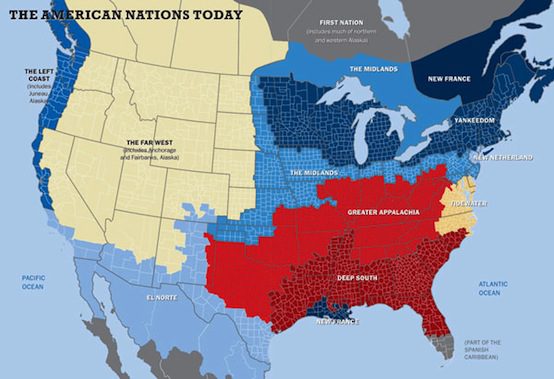The Eleven Nations Theory

I’ve received that map, and the accompanying story, about fifty billion times in the past week. I love things like this, for the thoughts they provoke and the conversations they start. It’s a scheme by Colin Woodard to sort out what he sees are the eleven cultural nations of North America. He describes the dominant cultural traits in each of the “nations,” and discusses how that explains their contrasting attitudes toward politics and suchlike. I found this especially interesting, because it describes the related but distinct cultures of the South:
TIDEWATER. Built by the younger sons of southern English gentry in the Chesapeake country and neighboring sections of Delaware and North Carolina, Tidewater was meant to reproduce the semifeudal society of the countryside they’d left behind. Standing in for the peasantry were indentured servants and, later, slaves. Tidewater places a high value on respect for authority and tradition, and very little on equality or public participation in politics. It was the most powerful of the American nations in the eighteenth century, but today it is in decline, partly because it was cut off from westward expansion by its boisterous Appalachian neighbors and, more recently, because it has been eaten away by the expanding federal halos around D.C. and Norfolk.
GREATER APPALACHIA. Founded in the early eighteenth century by wave upon wave of settlers from the war-ravaged borderlands of Northern Ireland, northern England, and the Scottish lowlands, Appalachia has been lampooned by writers and screenwriters as the home of hillbillies and rednecks. It transplanted a culture formed in a state of near constant danger and upheaval, characterized by a warrior ethic and a commitment to personal sovereignty and individual liberty. Intensely suspicious of lowland aristocrats and Yankee social engineers alike, Greater Appalachia has shifted alliances depending on who appeared to be the greatest threat to their freedom. It was with the Union in the Civil War. Since Reconstruction, and especially since the upheavals of the 1960s, it has joined with Deep South to counter federal overrides of local preference.
DEEP SOUTH. Established by English slave lords from Barbados, Deep South was meant as a West Indies–style slave society. This nation offered a version of classical Republicanism modeled on the slave states of the ancient world, where democracy was the privilege of the few and enslavement the natural lot of the many. Its caste systems smashed by outside intervention, it continues to fight against expanded federal powers, taxes on capital and the wealthy, and environmental, labor, and consumer regulations.
Or, in Florence King’s pithy, if dated, phrase, there’s the South of horses, tobacco, and Episcopalians, and there’s the South of mules, cotton, and Baptists.
I take issue with this one, though:
NEW FRANCE. Occupying the New Orleans area and southeastern Canada, New France blends the folkways of ancien régime northern French peasantry with the traditions and values of the aboriginal people they encountered in northwestern North America. After a long history of imperial oppression, its people have emerged as down-to-earth, egalitarian, and consensus driven, among the most liberal on the continent, with unusually tolerant attitudes toward gays and people of all races and a ready acceptance of government involvement in the economy. The New French influence is manifest in Canada, where multiculturalism and negotiated consensus are treasured.
Quebec, maybe, and New Orleans, certainly, but you would be hard-pressed to go into Cajun country, which Woodard and describe the social attitudes as “among the most liberal on the continent.” And for that matter, New Orleans was segregated within living memory, and even today its liberality is not the same thing as San Francisco’s or New York’s. And yet, even in the conservative Cajun country here in south Louisiana, there is a cultural orientation that is, in a sense, more liberal than the Deep South, which includes the northern part of Louisiana. It has to do with a greater tolerance for sins of the flesh. Sex, food, drink, passing a good time — all the things we associate with Latin culture. According to the map, my parish is at the Southernmost boundary of the Deep South, and that’s true, to an extent; we really are noticeably different from the New France parishes, because we were settled first by English planters. Yet we are noticeably different from other Deep South parishes and counties, because there’s more of New France’s laissez-faire in our social attitudes than you would find in north Louisiana. In fact, growing up here, I was always aware that our people weren’t like north Louisiana people, who are “big Baptists,” as people would say — not as a pejorative, but rather simply to describe a generally more pious, abstemiously Protestant culture than our more laid-back Protestant culture.
Anyway, before you get up in arms about how you live in one of these nations, and are NOTHING like what’s described here, note well what Woodard says:
Before I describe the nations, I should underscore that my observations refer to the dominant culture, not the individual inhabitants, of each region. In every town, city, and state you’ll likely find a full range of political opinions and social preferences. Even in the reddest of red counties and bluest of blue ones, twenty to forty percent of voters cast ballots for the “wrong” team. It isn’t that residents of one or another nation all think the same, but rather that they are all embedded within a cultural framework of deep-seated preferences and attitudes—each of which a person may like or hate, but has to deal with nonetheless. Because of slavery, the African American experience has been different from that of other settlers and immigrants, but it too has varied by nation, as black people confronted the dominant cultural and institutional norms of each.
Subscribe for as little as $5/mo to start commenting on Rod’s blog.